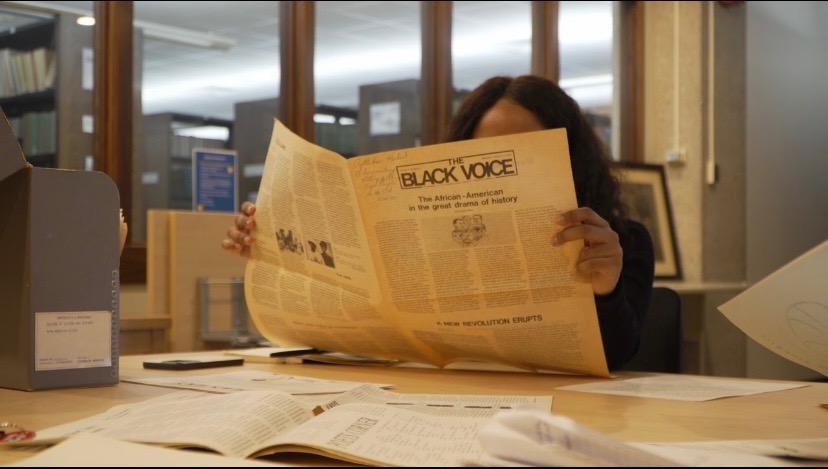A new documentary titled “We the Vision“ will commemorate the 50th anniversary of the founding of The Black Voice, which is University of Wisconsin’s only newspaper made by and for Black students, with its debut at the Marquee Theater on March 1 at 6 p.m.
Told by current and former members of The Black Voice, “We the Vision” describes how the newspaper was created, how it influenced the UW campus and how its legacy remains, according to UW Diversity, Equity, and Inclusion.
Made to amplify Black voices on a majority white campus, the documentary will showcase the “immovable persistence” of Black students, according to UW Diversity, Equity, and Inclusion.
Fundraising campaign for Center for Black Excellence commences
“I hope that the general campus community gains an insight into the impact and legacy that The Black Voice has had on the entire campus as a whole,” UW alumni and former co-Editor-in-Chief Nile Lansana said.
The Black Voice was originally founded in 1971, but only ran for two years, according to The Black Voice Instagram account. The newspaper was created after the 1969 Black Student Strike took place at UW, according to The Black Voice.
In 2015, the paper was revived by UW senior Jordan Gaines and has been in production ever since, according to UW-Madison Diversity, Equity, and Inclusion. Today, The Black Voice is a registered student organization, consisting of seven executive board members and over 30 alumni.
At the beginning of the 2020-21 school year, the idea to make a documentary about The Black Voice started to take shape, Lansana said. School of Journalism and Mass Communications professor Pat Hastings approached The Black Voice seniors Lansana, Chelsea Hylton and Enjoyiana Nururdin with the idea, which they agreed to, Lansana said.
Different century, same fight: Black students battle for similar causes half a century later
Along with marking the 50th anniversary of The Black Voice’s first publication, 2021 marked one year since the COVID-19 pandemic began. The pandemic forced documentary creators to conduct interviews over Zoom, Lansana said.
Finally, in spring 2021, they met in the Black Cultural Center on campus to conduct in-person interviews, Lansana said.
“It was a really beautiful moment to get to do that together as seniors and as the editors of The Black Voice last year,” Lansana said.
During Lansana’s undergraduate years, The Black Voice held most of their meetings in the Black Cultural Center and the Multicultural Student Center, so reuniting in that same location post-pandemic felt special.
As well as producing “We the Vision,” The Black Voice has been working on a number of other projects, like last year’s “Capturing the Culture” edition, which was the paper’s first print issue in almost 50 years, Lansana said.
The publication also held a number of Zoom events, including one titled, “Black Journalists Matter,” Lansana said. Amid these other projects, and with graduation approaching fast, the documentary fell to the wayside, Lansana said. But in October 2021, The Black Voice members started to discuss finishing the documentary, and with the help of Lansana and other alumni, these plans went forward.
The creation of the project was a collaborative effort, bringing together former and current members of The Black Voice as well as the larger campus community, current Editor-in-Chief Lauryn Azu said.
Hey Siri, where are you from? The history behind voice assistants
“We had a lot of assistance from University Communications,” Azu said. “They had the knowledge of how to operate the camera and how to edit the video.”
As the organization’s first public, in-person event since the start of the pandemic, the documentary screening is a reintroduction of The Black Voice to the community, Azu said.
“It is a powerful and illustrious and important history, and you cannot tell this campus’s history without The Black Voice,” Lansana said.
The documentary viewing will also serve as a reunion for current and former members of The Black Voice, Lansana said.
Pride flag on public government properties, new legislation for LGBTQ ignites decades-old divide
Currently, The Black Voice has six paid executive board members and is receiving funding from the Associated Students of Madison for the first year, according to The Black Voice.
The Black Voice alumni have gone on to become filmmakers, television anchors, business reporters and artists, according to UW-Madison’s Diversity, Equity, and Inclusion. They are also journalists and professional communicators at PBS, the Wall Street Journal, Bloomberg News, NBC, the Kansas City Star and other organizations.
“We the Vision” will be shown at the Marquee Theater in Union South March 1 at 6 p.m., according to the UW-Madison events calendar. The premiere was originally scheduled for Feb. 22 at 6 p.m. but was postponed due to inclement weather.
Editor’s note: This story was updated on Feb. 22 at 2:40 p.m. to reflect a change in the premiere date of the documentary. The premiere was originally scheduled for Feb. 22 at 6 p.m. but was postponed due to inclement weather and will now be held March 1 at 6 p.m. in the Marquee Theater.














